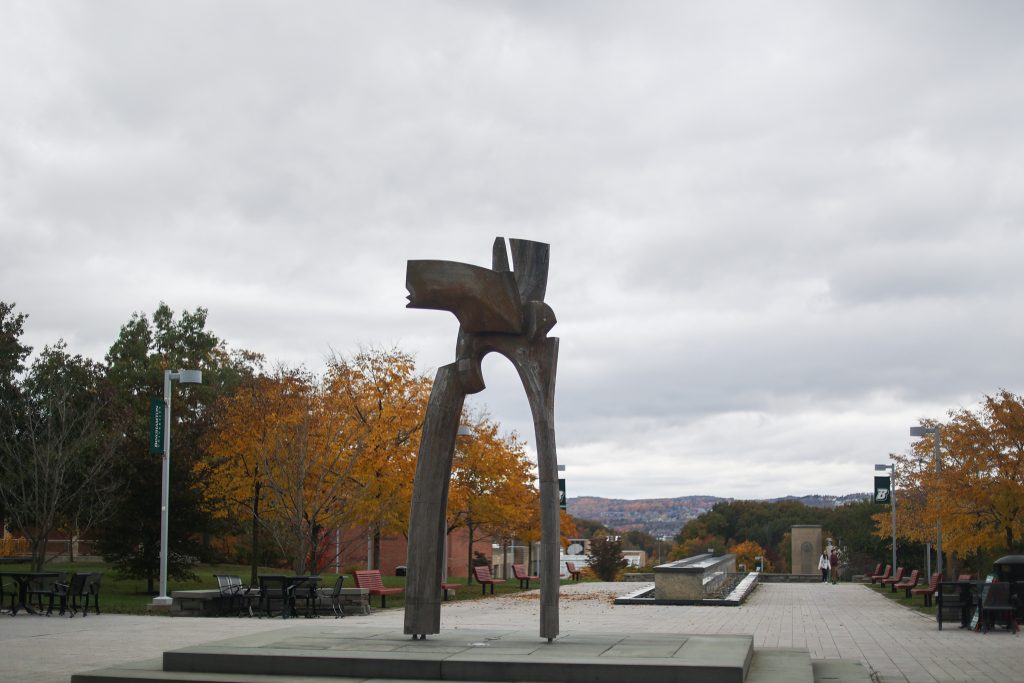Newly chartered by the Student Association (SA), Binghamton University’s Students for Justice in Palestine (SJP) is looking to the future.
Advocating for Palestinian empowerment — both in historic Palestine and throughout the diaspora — SJP was provisionally chartered by the SA in May 2022, which afforded them increased funding and other resources. Under the SA’s Management Policies, chartering falls under the authority of the executive vice president (EVP) and the SA Congress’ Internal Affairs (IA) Committee.
“We are grateful to say that the SA chartering process went well,” SJP’s E-Board wrote in a statement to Pipe Dream. “We were treated fairly and kindly by the SA and are grateful for the support we’ve received throughout the process. Meeting with [the] SA’s E-Board was consistently productive, and they played an impactful role in helping us.”
Since this iteration of SJP was formed, the group has held general body meetings that serve to educate about worldly developments, celebrate Palestinian culture and channel student support for the Palestinian struggle. Last semester, events included a potluck with the University’s Center for Middle East and North African Studies and the newly-formed Arab Student Association, introducing students to Tarneeb — a popular Palestinian card game — and movie screenings.
SJP also organized several rallies and a vigil in support of besieged Gazans in the aftermath of Oct. 7. Last Tuesday, the group collaborated with Thurgood Marshall Pre-Law Society to inform the student body about the Republic of South Africa’s genocide case against the State of Israel at the International Court of Justice, the United Nations’ highest court.
“We hope to be a conduit for advocacy on campus, as well as an amplifier for the many voices on campus who stand in solidarity with Palestine,” the E-Board wrote. “With the brilliant display of solidarity that so many people and organizations showed last semester, we are very motivated to make sure that our voices are not ignored and dismissed. We believe that it’s very important to accurately represent the strong solidarity for Palestine that so many students [at BU] share.”
Chance Fiorisi, the current EVP and a junior majoring in political science, was a freshman Congress representative when SJP received its provisional charter. He said that provisionally chartered organizations typically have a three-semester window to earn a full charter.
According to SA policy, after an insurance company approves a prospective organization, the EVP must recommend it to the IA Committee, which then grants a provisional charter by majority vote. All organizations must further the goals of the SA, not duplicate an existing group without reason, have viable plans to operate and survive long-term, not exist solely for personal financial gain, be covered by insurance and comply with SA rules and meet constitutional requirements.
“Being chartered has enabled us to drastically do more by saving us time and effort, allowing us to redirect that into more advocacy and representation on campus,” SJP’s E-Board wrote. “These changes have only expanded our potential to grow on campus and leave a stronger impression that accurately represents SJP and the strong and vibrant solidarity that exists on this campus.”
Pro-Palestinian groups have faced systemic pressure since October at universities across the United States, drawing criticism from advocates and free speech nonprofits, like the American Civil Liberties Union. Last November, Brandeis University revoked recognition from its SJP chapter. Shortly after, Columbia University suspended SJP and Jewish Voice for Peace — a progressive Jewish anti-Zionist group. Echoing those calls was Rep. Marc Molinaro, who represents Greater Binghamton in the U.S. House of Representatives, who called for a ban on SJP, both at BU and universities nationwide.
Despite organized opposition, SJP’s E-Board expressed their plans for this coming semester and beyond.
“Our goal is to continue growing, educating, spreading awareness [and] advocating, as well as commemorating the culture that Palestinians risk losing,” they wrote. “Success for SJP is honoring the lives that were lost, as well as the rich lives that were lived, and giving both of those voices a space on this campus. We plan to have more rallies, education events [and] cultural events, and we are looking forward to seeing your support.”



